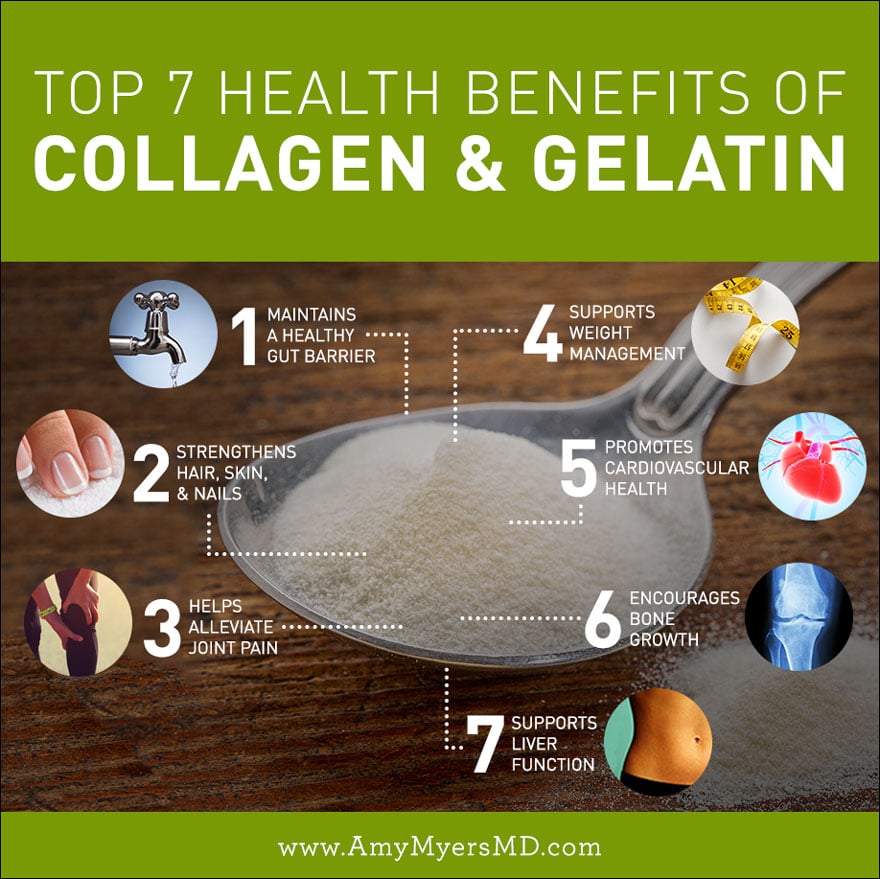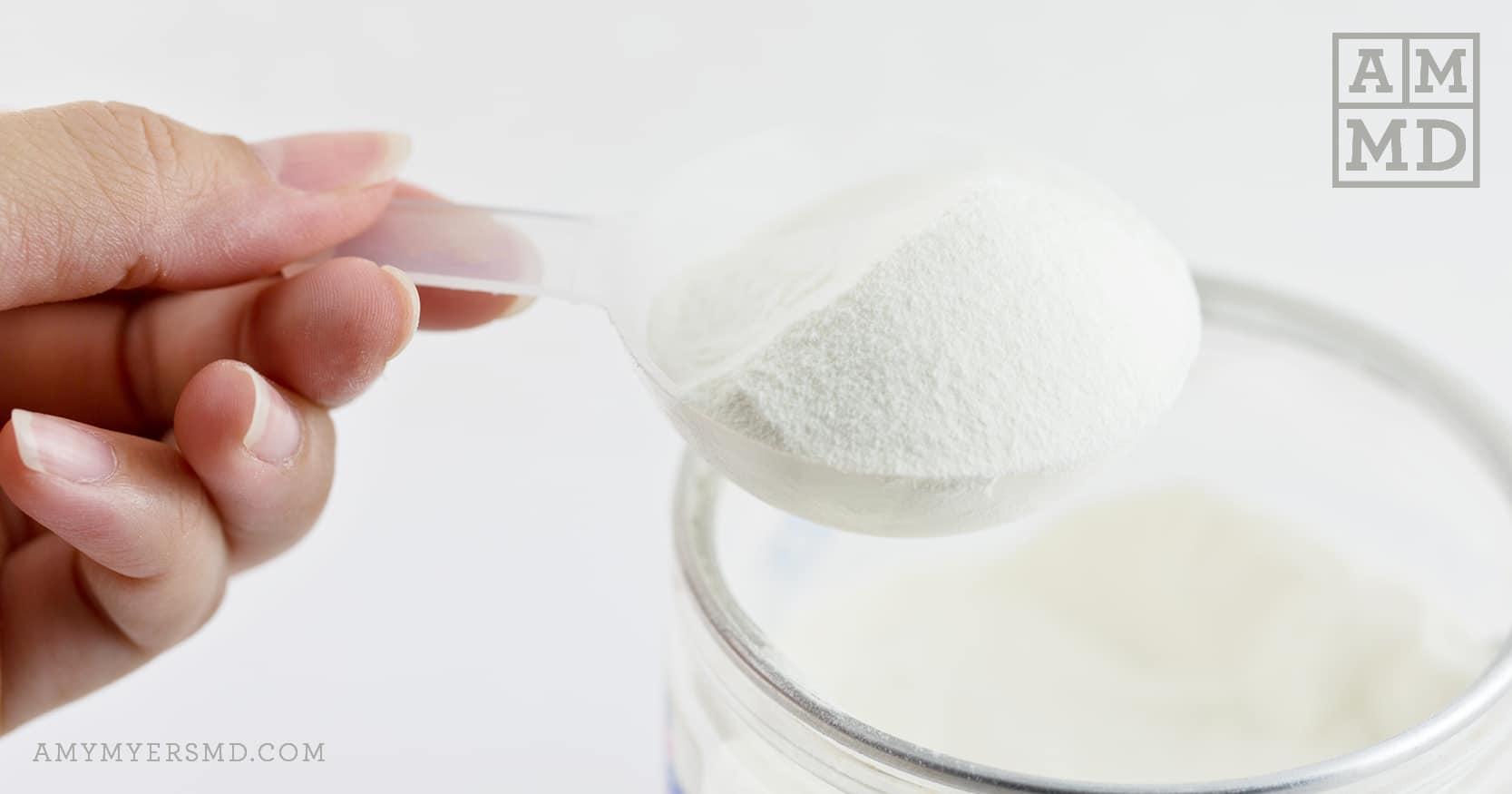Two of the trendiest items in the Paleo, AIP (Autoimmune Protocol), and natural food worlds are gelatin and collagen. These popular staples line the shelves of grocery and health food stores alike, and you can find them in countless recipes including some in The Autoimmune Solution Cookbook.
And for good reason! They are both packed with amino acids that provide tons of health benefits.1 Our ancestors got plenty of these key amino acids by eating the connective tissues, tendons, and other odds and ends of animals. However, we mostly lacking these foods in our modern diets. This is why adding gelatin and collagen into our foods and drinks is so helpful. It’s also why we’re seeing so many new gelatin and collagen products on the market.
I am often asked, “Does your gut know the difference?” and “Are they used the same way?”
Those are two great questions. They are actually used in very different ways. (Hint: All of you dessert and baked goods lovers are going to really love gelatin!)
First, let me explain why they’re so beneficial to your health. Then I’ll tackle the differences and show you how you can use them.
How are Gelatin & Collagen Different?
When it comes to the health benefits of gelatin and collagen, they are actually identical. That’s because gelatin is the cooked form of collagen. the cooking gives it a very different texture and is what gives them different uses. More on that below.
Collagen is the most important and abundant structural protein in your body. Think of collagen as the ‘glue’ that holds your body together. Your skin, gut barrier, bones, connective tissue, cartilage, and joints all depend on ample collagen to be healthy, strong and flexible. You actually have more collagen in your body than any other type of protein.2 Gram for gram it’s stronger than steel!
Starting at about age 35, your collagen production naturally begins to slow. By age 40, collagen begins to deplete faster than your body can reproduce it. By age 60, over ½ of your body’s collagen has been depleted.3 In addition to aging, other factors impact collagen levels, including genetics, smoking, pollution, excessive sun exposure, and nutritional deficiencies.
Health Benefits of Gelatin & Collagen
The reason I love collagen and gelatin is that they help repair a leaky gut! Nearly 80% of your immune system is located in your gut and leaky gut is a precursor to autoimmunity. This makes repairing your gut the very first step in reversing autoimmunity.
Collagen and gelatin are so important in leaky gut because they are the basic building blocks of your intestinal wall. The microscopic folds or “villi” in the intestines are built of collagen. The amino acids in collagen heal these damaged cells and build new tissue.4
Along with repairing a leaky gut, collagen and gelatin strengthen hair, skin, and nails. They can help prevent joint pain, support weight management, protect your heart, support bone repair, and positively impact liver function.
 Dr. Amy Myers
March 5th, 2018
https://content.amymyersmd.com/article/benefits-gelatin-collagen/The Top 7 Health Benefits of Collagen & Gelatin – Infographic – Amy Myers MD®
Dr. Amy Myers
March 5th, 2018
https://content.amymyersmd.com/article/benefits-gelatin-collagen/The Top 7 Health Benefits of Collagen & Gelatin – Infographic – Amy Myers MD®How to Use Gelatin
Gelatin is a culinary superstar for many reasons. It’s completely flavorless and can be added to tons of different recipes. First, it functions as a binder in any recipe in place of eggs, which contain inflammatory proteins. Now you can bake delicious sweet and savory foods without eggs and easily adapt your favorite dishes to be autoimmune-approved!
Another culinary benefit of gelatin is that it serves to “gel” substances it is added to. It’s perfect for thickening sauces and soups. Just make sure you slowly add it to hot liquids and allow it to work its magic, making sauces and soups richer and thicker.
And of course, you can use it to make gummies, homemade marshmallows, and other gelatin-based treats!
Gelatin is featured in some of the breakfast and dessert recipes in my new cookbook, The Autoimmune Solution Cookbook!
How to Use Collagen
Hydrolyzed collagen is the uncooked form of collagen. It is also completely flavorless and can be added to any liquid. Unlike gelatin, however, it dissolves instantly in hot or cold liquids and does not change the texture. It’s great for making smoothies, juices, tea, and even water.
I used The Myers Way® Collagen in The Autoimmune Solution Cookbook to add a gut-repairing boost to many of the delicious recipes!
How to Choose High-Quality Gelatin and Collagen
Thanks to the rise in popularity of both gelatin and collagen, the market has been flooded with tons of new products. However, there are some low-quality options out there, so here’s are the keys to choosing a gelatin or collagen product:
- Choose gelatin and collagen from grass-fed, pasture-raised animals only
- Make sure the animals were never given GMO feed, hormones, or antibiotics
- Avoid options with additives, preservatives, or other unnecessary ingredients
I use both gelatin and collagen on a daily basis. They impact gut health; hair, skin, and nails; healthy joints and bones; optimal weight management; and detox support. That’s why it’s so important that the products are exceptionally high quality. And why I decided to make my own!
The Myers Way® Collagen is sourced from grass-fed cows that are never given antibiotics, hormones, or GMO feed. They contain only pure collagen, without any added ingredients.

Article Sources
- What Is Gelatin Good For? Benefits, Uses, and More. Alexandra Rowles. Healthline. 2017.
- Collagen: The Fibrous Proteins of the Matrix. Lodish H, Berk A, Zipurskey SL. NCBI. 2000.
- Decreased Collagen Production in Chronically Aged Skin. James Varani, Michael K Dame, Laure Rittie, Suzanne E G Fligiel, Sewon Kang, Gary J Fisher, John J Vorhees. NCBI. 2006.
- A Microengineered Collagen Scaffold for Generating a Polarized Crypt-Villus Architecture of Human Small Intestinal Epithelium. Yuli Wang, Dulan B Gunasekara, Mark I Reed, Matthre DiSalvo, Scott J Bultman, Christopher E Sims, Scott T Magness, Nancy L Allbritton. NCBI. 2017.
